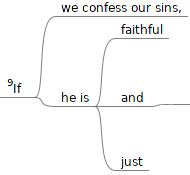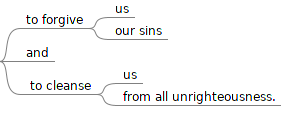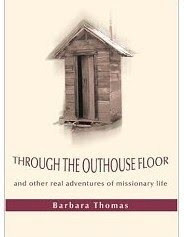The narrative found in 1 Kings 13 is very important to me, personally, because it played a key role in figuring out what to do in my life. How do we understand God’s call on an individual? But despite the very clear and very personal application illuminated to me at that time, I don’t think that message is central to the narrative; something much larger is. Reading through the Kings, one often finds an Israelite king evaluated on where he stands regarding “the sin of Jeroboam”. You find this everywhere. But what is this sin? This is the chapter that describes God’s careful, repeated pleas to Jeroboam, and his response. So this is, at least for me, another shining example of Grace in the old testament. This wicked king is not simply cast aside, but he is given repeated clear warnings, followed by repeated confirmations. God grant that we would fear this example, listen to God’s word, trust Him, and repent.
The story begins on the heels of the division of the nation in chapter 12 into the northern Israel, now lead by Jeroboam, and the southern Judah, still lead by Rehoboam the son of Solomon and grandson of David. Since long before the capital was decided, Moses made clear that national unity would be upheld in part by having a single altar on which to worship God –which is why worshiping on other “high places” was a problem for many of the Israelite kings. In case you might doubt that Jeroboam had read his Moses, he makes his rationale for setting up new altars clear (all ESV):
26And Jeroboam said in his heart, “Now the kingdom will turn back to the house of David. 27If this people go up to offer sacrifices in the temple of the Lord at Jerusalem, then the heart of this people will turn again to their lord, to Rehoboam king of Judah, and they will kill me and return to Rehoboam king of Judah.” 28So the king took counsel and made two calves of gold. And he said to the people, “You have gone up to Jerusalem long enough. Behold your gods, O Israel, who brought you up out of the land of Egypt.” 29And he set one in Bethel, and the other he put in Dan.
So the point of these altars (at the southern and northern limits of his domain) was to give people some other place to worship, so they wouldn’t reunite the country under the worship prescribed by Moses and the line of David (and ultimately kill him, as well).
God’s assessment of this move is clear enough, calling the people religious tourists:
30Then this thing became a sin, for the people went as far as Dan to be before one. 31He also made temples on high places and appointed priests from among all the people, who were not of the Levites. 32And Jeroboam appointed a feast on the fifteenth day of the eighth month like the feast that was in Judah, and he offered sacrifices on the altar. So he did in Bethel, sacrificing to the calves that he made. And he placed in Bethel the priests of the high places that he had made. 33He went up to the altar that he had made in Bethel on the fifteenth day in the eighth month, in the month that he had devised from his own heart. And he instituted a feast for the people of Israel and went up to the altar to make offerings.
So Jeroboam made up his own gods/idols to worship, his own places to worship them, his own schedule for worshiping, and his own priests to run the whole thing. He basically reinvented everything God had handed down through Moses, to forge a new identity for the northern kingdom, to cement his rule, and save his life.
The question now is, given this full-frontal assault on the worship of God, what will God do about it? Chapter thirteen tells the story of a prophet God sent from the southern Kingdom:
1And behold, a man of God came out of Judah by the word of the Lord to Bethel. Jeroboam was standing by the altar to make offerings.
I think it is important that the setting is Jeroboam, in the middle of making his own offerings at this altar, since the prophecy has to do with both him and the altar. First, against the altar:
2And the man cried against the altar by the word of the Lord and said, “O altar, altar, thus says the Lord: ‘Behold, a son shall be born to the house of David, Josiah by name, and he shall sacrifice on you the priests of the high places who make offerings on you, and human bones shall be burned on you.’”
In light of what I wrote above, you could take this to mean that the Davidic line that you thought to overcome with this altar will ultimately overcome this altar, and you and your priests will be overcome as well. And to confirm this word, he gave a sign:
3And he gave a sign the same day, saying, “This is the sign that the Lord has spoken: ‘Behold, the altar shall be torn down, and the ashes that are on it shall be poured out.’”
But Jeroboam does not bend to this; rather, he attacks the prophet, and in response receives a sign in his own body:
4And when the king heard the saying of the man of God, which he cried against the altar at Bethel, Jeroboam stretched out his hand from the altar, saying, “Seize him.” And his hand, which he stretched out against him, dried up, so that he could not draw it back to himself.
Then the sign from v3 is fulfilled:
5The altar also was torn down, and the ashes poured out from the altar, according to the sign that the man of God had given by the word of the Lord.
What comes next is a dynamic that always intrigues me. What does God strike someone, only to then heal? He did the same thing with Moses and Pharoah, on multiple occasions. I think it is at least twofold. First, if there was any doubt why the sign occurred, that doubt is removed by the fact that the prophet has the ear of God to heal it:
6And the king said to the man of God, “Entreat now the favor of the Lord your God, and pray for me, that my hand may be restored to me.” And the man of God entreated the Lord, and the king’s hand was restored to him and became as it was before.
But the second reason God did this, I think, is a theme I see developing through this whole chapter: God is being merciful. It’s like God says, “Look, I could just cripple/kill you and be done with it, but I’m not going to. I don’t want you crippled/dead, I want you repentant.”
Jeroboam seems to get that mercy, and he wants to reward the prophet:
7And the king said to the man of God, “Come home with me, and refresh yourself, and I will give you a reward.”
The prophet refuses:
8And the man of God said to the king, “If you give me half your house, I will not go in with you. And I will not eat bread or drink water in this place,
And then he says why, revealing information that is key to the whole chapter:
9for so was it commanded me by the word of the Lord, saying, ‘You shall neither eat bread nor drink water nor return by the way that you came.’”
That is, this prophet was not just given a word to speak against the altar, and against Jeroboam and his priests, but he was also himself given a command about how he was to act in doing so. Don’t accept their hospitality, and don’t take the same route home. Act as if you are in hostile territory, because you are. And he looks ready to obey this command:
10So he went another way and did not return by the way that he came to Bethel.
Having concluded the first act, we are now introduced to another prophet, who lives in the northern kingdom, and is informed of everything that happened at the altar:
11Now an old prophet lived in Bethel. And his sons came and told him all that the man of God had done that day in Bethel. They also told to their father the words that he had spoken to the king.
For whatever reason, this prophet chases down the other:
12And their father said to them, “Which way did he go?” And his sons showed him the way that the man of God who came from Judah had gone. 13And he said to his sons, “Saddle the donkey for me.” So they saddled the donkey for him and he mounted it.
And he finds him and confirms his identity:
14And he went after the man of God and found him sitting under an oak. And he said to him, “Are you the man of God who came from Judah?” And he said, “I am.”
And he also offers him hospitality:
15Then he said to him, “Come home with me and eat bread.”
Maybe this was just to be nice, but this prophet new he was asking the other to disobey the command God had given him. And again at first, the prophet refuses, in obedience to the Lord’s command:
16And he said, “I may not return with you, or go in with you, neither will I eat bread nor drink water with you in this place, 17for it was said to me by the word of the Lord, ‘You shall neither eat bread nor drink water there, nor return by the way that you came.’”
So far so good for the Judean prophet. But this is where things get sticky, as the Israelite prophet tests his resolve with a lie:
18And he said to him, “I also am a prophet as you are, and an angel spoke to me by the word of the Lord, saying, ‘Bring him back with you into your house that he may eat bread and drink water.’” But he lied to him.
It is important to understand (for what follows) that the lie doesn’t have to include everything that he said. He was a prophet: he is described as a prophet in v11, and gives true prophecy from the Lord in v21. He is certainly not “as you are” in all respects, but the clear lie is the word he claims to have received. In the face of the lie, the Judean prophet relents, and accepts his hospitality:
19So he went back with him and ate bread in his house and drank water.
Having now disobeyed the command he was given by God, God sends a word to the other prophet, declaring the Judean prophet’s doom:
20And as they sat at the table, the word of the Lord came to the prophet who had brought him back. 21And he cried to the man of God who came from Judah, “Thus says the Lord, ‘Because you have disobeyed the word of the Lord and have not kept the command that the Lord your God commanded you, 22but have come back and have eaten bread and drunk water in the place of which he said to you, “Eat no bread and drink no water,” your body shall not come to the tomb of your fathers.’”
In what seems highly ironic to me, he then continues to be hospitable to the prophet, and send him on his way. Hi could have forced the fulfillment of his prophecy by killing him there, but he didn’t:
23And after he had eaten bread and drunk, he saddled the donkey for the prophet whom he had brought back.
But the word of the Israelite prophet was fulfilled:
24And as he went away a lion met him on the road and killed him. And his body was thrown in the road, and the donkey stood beside it; the lion also stood beside the body.
The Israelite prophet hears what happened, and correctly interprets the news:
25And behold, men passed by and saw the body thrown in the road and the lion standing by the body. And they came and told it in the city where the old prophet lived. 26And when the prophet who had brought him back from the way heard of it, he said, “It is the man of God who disobeyed the word of the Lord; therefore the Lord has given him to the lion, which has torn him and killed him, according to the word that the Lord spoke to him.”
Not that the word that the Lord spoke to him was the word spoken by the Israelite prophet, over the forbidden meal. He goes to get the body, noting the remarkable circumstance that neither the man nor the donkey had been mauled:
27And he said to his sons, “Saddle the donkey for me.” And they saddled it. 28And he went and found his body thrown in the road, and the donkey and the lion standing beside the body. The lion had not eaten the body or torn the donkey.
so he took the body of the Judean prophet, brought him home, and mourned him:
29And the prophet took up the body of the man of God and laid it on the donkey and brought it back to the city to mourn and to bury him. 30And he laid the body in his own grave. And they mourned over him, saying, “Alas, my brother!” 31And after he had buried him, he said to his sons, “When I die, bury me in the grave in which the man of God is buried; lay my bones beside his bones.
This might seem too much irony, for the man who laid the trap that killed the Judean prophet, to mourn him so. But with the next line we understand that his action has been further confirmation of the word spoken to the Judean prophet:
32For the saying that he called out by the word of the Lord against the altar in Bethel and against all the houses of the high places that are in the cities of Samaria shall surely come to pass.”
That is, we have the initial sign of the altar being split (given in v3, accomplished in v5), the sign of Jeroboam’s paralysis (stricken in v4, healed in v6), but now also the confirmation that the third thing the prophet said was also God’s command: that he should not accept hospitality in Israel. This word is confirmed by the miraculous manner of his death, once he disobeyed that command. So that we know that this was a true prophet, and that they word that he declared against the altar would come to pass.
Unfortunately, given all these proofs, Jeroboam did not repent:
33After this thing Jeroboam did not turn from his evil way, but made priests for the high places again from among all the people. Any who would, he ordained to be priests of the high places. 34And this thing became sin to the house of Jeroboam, so as to cut it off and to destroy it from the face of the earth.
This sin ultimately leads to the removal of this kingdom from the land, as foretold in chapter 14:15-16, in response to Jeroboam’s wife’s covert inquiry about their sick son:
the Lord will strike Israel as a reed is shaken in the water, and root up Israel out of this good land that he gave to their fathers and scatter them beyond the Euphrates, because they have made their Asherim, provoking the Lord to anger. And he will give Israel up because of the sins of Jeroboam, which he sinned and made Israel to sin.
This is a stark contrast to the commendation of David in chapter 15:4-5, after the birth of Rehoboam’s son, sinful and faithless Abijam:
Nevertheless, for David’s sake the Lord his God gave him a lamp in Jerusalem, setting up his son after him, and establishing Jerusalem, because David did what was right in the eyes of the Lord and did not turn aside from anything that he commanded him all the days of his life, except in the matter of Uriah the Hittite.
It seems to me that there are so many things we can and will get wrong, but that isn’t God’s primary concern. Even David’s commendation includes the matter of Uriah the Hittite, a “small affair” of adultery, lying, and eventually murder. The difference I see is that David was repentant, asked for Grace, and received it. On the other hand, Jeroboam received multiple proofs that God was serious, but refused to bend, and ultimately led to the destruction of his nation.
There is another application that I take from this, for the Man of God. His real moment of failure was falling for the lie, in preference to the word given to himself. So, when faced with a word of God in apparent conflict with another word of God, take another look, and see the lie for what it is.








